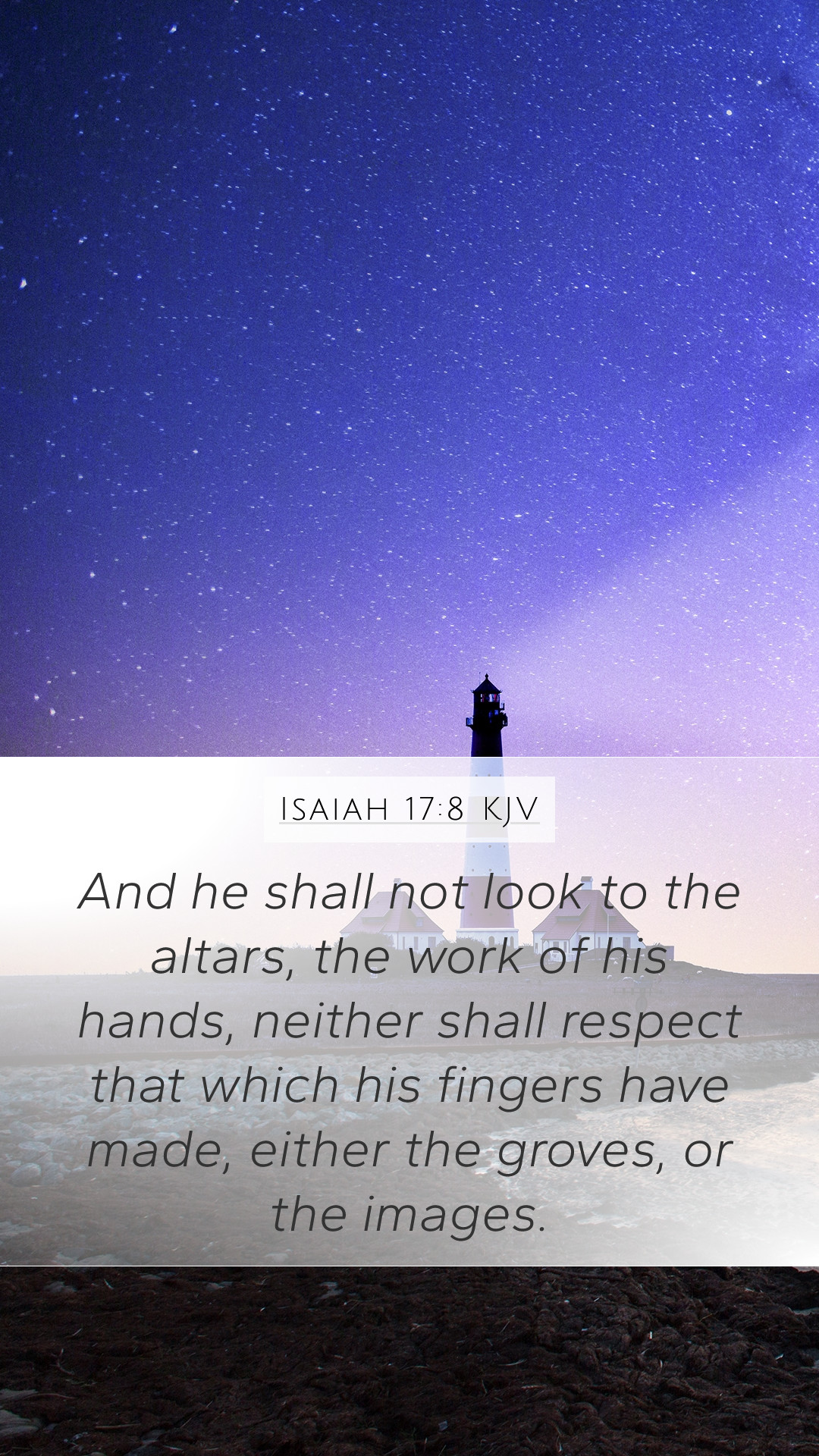Understanding Isaiah 17:8
Isaiah 17:8 states, "And he shall not look to the altars, the work of his hands, neither shall respect that which his fingers have made, either the groves or the images." This verse presents a prophetic statement regarding the people of Israel and their abandonment of idolatry. Below is a combined insight from public domain commentaries such as those by Matthew Henry, Albert Barnes, and Adam Clarke.
Bible Verse Commentary and Explanation
This scripture can be understood in several key components:
- Idolatry as Sin: The idolatrous practices of the people of Israel are highlighted. The altars mentioned are symbols of false worship, contrasting with the worship of Yahweh.
- Divine Judgment: The abandonment of these altars signifies a coming judgment. They will no longer rely on their own creations for salvation but will turn to the true God.
- Recognition of God: The verse illustrates a moment when people will realize the futility of their own hands in seeking divine favor.
Insights from Commentaries
Combining insights from several renowned biblical commentators:
Matthew Henry:
Henry elucidates that the passage reflects a time when the people would turn from their idols to the God who created them. The judgment and subsequent rejection of false gods are integral in highlighting God’s redemptive power.
Albert Barnes:
Barnes emphasizes the profound transformation that will occur among God’s people. This turning away from idols signifies a return to true worship and the restoration of a covenant relationship with God.
Adam Clarke:
Clarke interprets the passage as a prophetic declaration about the Israelites, indicating that they will no longer rely on man-made instruments for spiritual guidance. This reflects the ultimate covenant that God has with His people—a relationship grounded in faith, not in rituals or objects.
Historical Context and Application
To understand Isaiah 17:8 properly, it is crucial to consider its historical context:
- Context of Israel's History: During Isaiah's time, Israel had been heavily influenced by surrounding nations' practices, leading to widespread idolatry.
- Prophetic Tone: Isaiah's role as a prophet was to call the people back to faithful worship, stressing the importance of recognizing God's sovereignty.
- Spiritual Awakening: The verse foresees a future spiritual awakening where a remnant would emerge, rejecting idols in favor of true devotion to God.
Applying Isaiah 17:8 to Daily Life
This verse prompts us to reflect on what modern-day idols might be present in our lives:
- Self-Sufficiency: Are we placing our trust in our abilities or achievements rather than in God?
- Materialism: Do we rely on material possessions for fulfillment instead of seeking spiritual richness?
- Influence of Society: How does societal pressure affect our relationship with God and our worship practices?
Related Bible Cross References
- Exodus 20:3-5 - The importance of not having other gods.
- Jeremiah 10:14 - The futility of idol worship.
- Hosea 14:3 - Returning to the Lord and rejecting the works of our hands.
Conclusion
Isaiah 17:8 serves as a significant reminder of the importance of true worship and the rejection of idolatry. It calls believers to examine their lives and forsake anything that detracts from their relationship with God. In understanding this verse, we gain deeper Bible verse meanings and Bible verse interpretations that guide our spiritual journey.
For further Bible study insights and analysis, resources like online Bible study tools can be quite beneficial.


